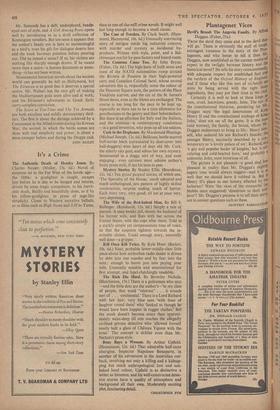Plantagenet Vices
Devil's Brood: The Angevin Family. By Alfre( Duggan. (Faber, 21s.) 'Fltom the devil they came and to the devil the) will go.' There is obviously the stuff of tough astringent romance in the story of the Pia° tagenets, and who better to tell it than Mr Duggan, now established as the current medixva expert in the twilight between history and 01( historical novel? He tells his story conscientiouslY with adequate respect for established fact an( the verdicts of the Oxford History of England and if those who like this sort of rechauge se store by being served with the right bash ingredients, they may put their trust in the chef Certainly it is well to look at these kings as men, cruel, lascivious, greedy, false. The eye °I the constitutional historian, pondering (as Mr. Duggan says) 'the legal innovations of 14.'111 Henry II and the constitutional mishaps of l‘ing John,' does not see all the game. It is the men (and women), the family, the brood, whom Mr Duggan endeavours to bring to life : Henry him self, who seduced his son Richard's fiancee; the younger Henry, succinctly described by a con temporary as 'a lovely palace of sin'; Richard, 001 'a gay and popular leader of knights,' but 'a cal culating and cold-hearted bore,' and probablY 3 sodomite; John, most notorious of all. The picture is not pleasant—a good deal les1 pleasant in reality than Mr. Duggan's slightil sugary tone would always suggest—and it is as well that we should have it rubbed in. But is Henry II's place in our history affected by his lecheries? Were 'the vices of the monarchs' (as Stubbs once suggested) 'disastrous to their sub jects'? Mr. Duggan's purpose is to tell their story' not to answer questions such as these. GEOFFREY BARRACLOH.-r-






















































 Previous page
Previous page